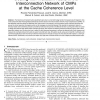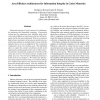15 search results - page 1 / 3 » Predicting Faults from Cached History |
ICSE
2007
IEEE-ACM
14 years 4 months ago
2007
IEEE-ACM
We analyze the version history of 7 software systems to predict the most fault prone entities and files. The basic assumption is that faults do not occur in isolation, but rather ...
TPDS
2010
12 years 11 months ago
2010
The importance of transient faults is predicted to grow due to current technology trends of increased scale of integration. One of the components that will be significantly affecte...
ICSE
2009
IEEE-ACM
13 years 9 months ago
2009
IEEE-ACM
Predicting the incidence of faults in code has been commonly associated with measuring complexity. In this paper, we propose complexity metrics that are based on the code change p...
ISCA
1999
IEEE
13 years 8 months ago
1999
IEEE
Information integrity in cache memories is a fundamental requirement for dependable computing. Conventional architectures for enhancing cache reliability using check codes make it...
EDCC
2006
Springer
13 years 8 months ago
2006
Springer
The importance of fault tolerance at the processor architecture level has been made increasingly important due to rapid advancements in the design and usage of high performance de...


